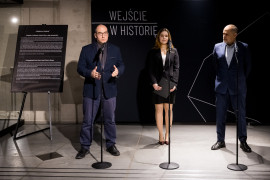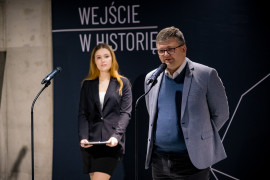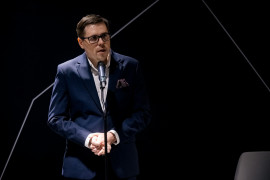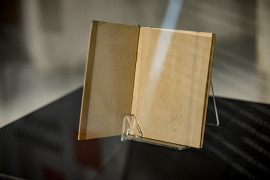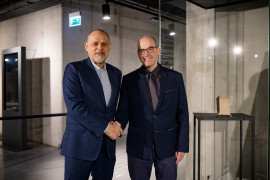A book from Józef Ulma’s collection in the Museum of the Second World War in Gdańsk - Instytut Pileckiego
A book from Józef Ulma’s collection in the Museum of the Second World War in Gdańsk
A book that once belonged to Józef Ulma from Markowa near Rzeszów, who was murdered by the Germans with his wife and children for sheltering Jews during the Second World War, was presented by the Pilecki Institute to the Museum of the Second World War.
The volume was formally presented as part of the “Entering History” periodic event, whose aim is chiefly to showcase selected artifacts which are not part of the museum’s permanent exhibition but which are connected with interesting events and personal stories, anniversaries, wartime occurrences and issues related to the period of war and occupation.
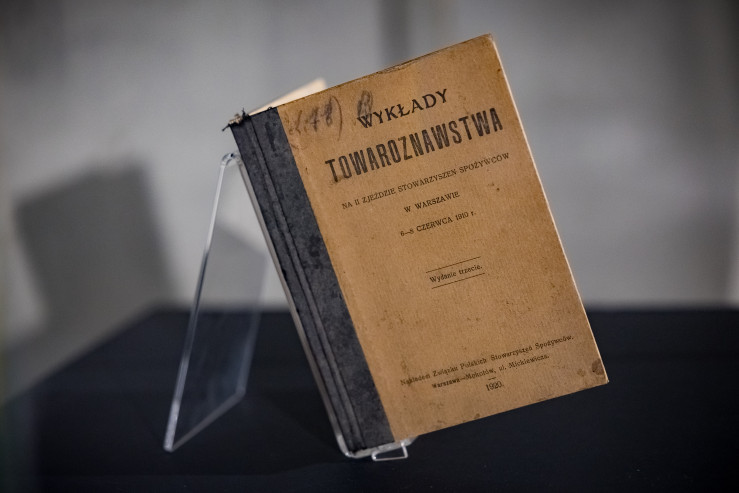
During the event, speeches were made by Dr. Wojciech Kozłowski, Deputy Director of the Pilecki Institute, and Prof. Rafał Wnuk, Acting Director of the Museum of the Second World War in Gdańsk. The history of the exhibit was presented by Kamil Kopera, a historian from the Pilecki Institute, and Dr. Wojciech Łukaszun, Head of the Collections Department of the Museum of the Second World War.
Józef Ulma had a household library, which he made available to the residents of Markowa. The volume titled Wykłady Towaroznawstwa comes from this collection, as evidenced by the owner’s signature and an assigned reference number. Ulma’s books were in great demand. The volume presented to the museum by the Pilecki Institute shows signs that the binding was repaired at some point. The repair was carried out by the owner with a binding machine of his own making.
In his village, Józef Ulma was known for numerous hobbies, as well as for introducing innovations and improvements to everyday life. Apart from running a library, he took an interest among others in photography, silkworm farming and the promotion of horticulture. He was active in the Polish Union of Rural Youth “Wici”. During the war, together with his wife Wiktoria, he provided shelter in his own house to eight Jewish acquaintances. On 24 March 1944, probably following a denunciation by a Polish “blue” policeman, German gendarmes arrived at the Ulma farm and murdered all the Jews in hiding, the Ulma spouses and their six children. At the moment of her death, Wiktoria Ulma was heavily pregnant. In 1995, Józef and Wiktoria Ulma were posthumously awarded the title of the Righteous Among the Nations. In 2023, the Ulma family were recognized as martyrs and beatified by the Catholic Church.
The book presented by the Pilecki Institute to the Museum of the Second World War had been preserved by the family of Józef Ulma’s brother.
During the ceremony, a letter from Józef Ulma’s nephew was read out. It was Jerzy Ulma who donated the valuable family heirloom to the Pilecki Institute and gave consent to its presentation at the main exhibition of the Museum of the Second World War in Gdańsk. In a letter addressed to the directors of both institutions, Jerzy Ulma emphasized:
The joint activities of the Pilecki Institute and the Museum contribute to the preservation of memory of our heroes. I would like to express my gratitude for your dedication to fostering the memory of people who did not hesitate to oppose evil and fight for the good of their neighbor. I am confident that thanks to your efforts, the story of the Ulma family and other heroes will be told and commemorated – told and commemorated in such a way as to be fully understood in today’s world.
The book with Ulma’s handwritten signature will be presented for the next month in a dedicated display case on level -3, just in front of the entrance to the main exhibition, and will later become part of the museum’s permanent exhibition.
The book will be placed in a section devoted to Polish grassroots aid initiatives aimed at rescuing Jews, where another artifact commemorating the hiding of Jews by another Polish family, the Joniuks, has been presented since the museum’s opening. The number of Jews seeking help was especially high in the wake of Operation Reinhard, when the Germans commenced mass deportations of Jews to extermination camps, explains Dr. Jan Szkudliński, Head of the Research Department of the Museum of the Second World War and one of the curators of the exhibition.
The book was presented to the museum during the “Called by Name” Program Partners Forum, which has been organized by the Pilecki Institute in the Museum of the Second World War in Gdańsk under the banner “Responsible for Memory”. The “called by name” are Poles who were executed by the Germans for trying to save Jews from the Holocaust during the German occupation at the time of the Second World War. The Pilecki Institute recovers their stories through a program that brings together academic research, historical education, and the culture of memory. A broad information campaign helps to introduce the fates of the “called by name” into the collective memory both in Poland and around the world. The chief goal of the Program Partners Forum is to integrate local government activists from the places where the commemorations had already taken place, to exchange experiences and encourage further activities aimed at promoting and disseminating the memory of these events. The symbolic stone with a commemorative plaque can become a living memorial only when people come together to develop various educational and promotional initiatives. This is possible solely in cooperation with local educators, employees of cultural institutions and historical societies. Recently, invitations to such meetings have also been extended to youth commune councils, whose ideas, creativity and fresh perspectives make it possible to pass on the memory to younger generations.
See also
- Competition for the position of Adjunct in the Humanities, Department for the study of Nazism and German occupation during the Second World War
News
Competition for the position of Adjunct in the Humanities, Department for the study of Nazism and German occupation during the Second World War
We invite you to participate in the competition for the position of Adjunct in the Humanities, Department for the study of Nazism and German occupation during the Second World War.
- PORTRAITS | Adam Bałdych Quintet
News
PORTRAITS | Adam Bałdych Quintet
“Portraits” is a moving story told through sound, in which jazz meets history and individual fates intertwine with the collective experience.
- Competition for the position of Adjunct in the Humanities
News
Competition for the position of Adjunct in the Humanities
Competition for the position of Adjunct in the Humanities, Department for the study of Nazism and German occupation during the Second World War at the Witold Pilecki Institute of Solidarity and Valor.
- Merry Christmas!
News
Merry Christmas!
On the occasion of Christmas, we wish you all the best and every success in 2026.
- The Lemkin Laboratory – the Pilecki Institute and the Mieroszewski Centre sign cooperation agreement
News
The Lemkin Laboratory – the Pilecki Institute and the Mieroszewski Centre sign cooperation agreement
- 2025 | Michał Bilewicz, „Traumaland. Polacy w cieniu przeszłości"
News
2025 | Michał Bilewicz, „Traumaland. Polacy w cieniu przeszłości"
Michał Bilewicz’s “Traumaland. Polacy w cieniu przeszłości” (Wydawnictwo MANDO/Wydawnictwo WAM) won the Witold Pilecki International Book Award in the “academic history book” category.
- 2025 | Emil Marat „Bratny. Hamlet rozstrzelany"
News
2025 | Emil Marat „Bratny. Hamlet rozstrzelany"
The book “Bratny. Hamlet rozstrzelany” (Wydawnictwo Czarne) won the Witold Pilecki International Book Award in the “historical reportage” category.
- Maksym Eristavi, Russian Colonialism 101. How to Occupy a Neighbor and Get Away with It. An Illustrated Guide
News
Maksym Eristavi, Russian Colonialism 101. How to Occupy a Neighbor and Get Away with It. An Illustrated Guide
Maksym Eristavi’s “Russian Colonialism 101. How to Occupy a Neighbor and Get Away with It. An Illustrated Guide” (IST Publishing) won the the Witold Pilecki International Book Award in the “special prize” category.
- The Witold Pilecki International Book Award: Bilewicz, Marat and Eristavi winners of the Institute’s 5th competition for best history book
News
The Witold Pilecki International Book Award: Bilewicz, Marat and Eristavi winners of the Institute’s 5th competition for best history book
The Witold Pilecki International Book Awards were presented during a ceremony on Thursday 11 December, in the auditorium of the Pilecki Institute.
- Conference summary “Die Haltung der deutschen Minderheiten im besetzten Europa (1939–1945). Forschungsmethoden, soziale Kontexte und Nachkriegsfolgen”
News
Conference summary “Die Haltung der deutschen Minderheiten im besetzten Europa (1939–1945). Forschungsmethoden, soziale Kontexte und Nachkriegsfolgen”
On 20–21 November 2025, an international academic conference was held in Berlin and addressed issues of the attitudes of the German population during the occupation and their postwar fate.
- Results of the Competition for the position of Manager of the Extraneous Branch of the Witold Pilecki Institute of Solidarity and Valor in Berlin
News
Results of the Competition for the position of Manager of the Extraneous Branch of the Witold Pilecki Institute of Solidarity and Valor in Berlin
Warsaw, 20 November 2025 | Announcement of the results of the Competition for the position of Manager of the Extraneous Branch of the Witold Pilecki Institute of Solidarity and Valor in Berlin.
- Nominations for the Witold Pilecki International Book Award 2025 (fifth edition)
News
Nominations for the Witold Pilecki International Book Award 2025 (fifth edition)
We know the authors nominated for the fifth edition of the Witold Pilecki International Book Award! Out of 60 submissions, the Awards Committee has selected 12 publications to compete in three categories.
